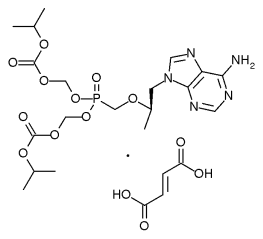On December 17 Gilead Sciences announced that it would make its antiretroviral (tenofovir disoproxil fumarate, brand name Viread) available at cost to qualified organizations providing HIV treatment in all 53 nations in Africa, and 15 additional countries classified as "least developed" by the United Nations. The company said the program would be running by the second quarter of 2003. Information and technical assistance in applying for and using the drug will also be provided.
Also, Gilead will participate in the 3,000-patient Development of Antiretroviral Therapies (DART) study, sponsored by the UK's Medical Research Council, which will begin in 2003 in Uganda and Zimbabwe, to evaluate antiretroviral treatment strategies where resources are limited. In addition it is studying tenofovir to prevent transmission of HIV.
The text of the press announcement is at: http://www.gilead.com/wt/sec/pr_1040081128. For more information about the drug, see http://www.viread.com.
Comment
Tenofovir is an important drug because it is easy to use (one pill per day), has less problem with side effects than most antiretrovirals, and leads to relatively slow development of HIV drug resistance. However, side effects and drug resistance do occur--and resistant virus is likely to be cross-resistant to AZT and to some other HIV drugs as well. So when used to treat existing HIV infection, tenofovir must be combined with other antiretrovirals to reduce this resistance.
This is not the only program to provide an antiretroviral at cost in some poor countries. It may be better designed than some of the others, in reducing cumbersome country-by-country negotiation and administration.
There are some concerns. "At cost" can translate to several times the price at which a generic manufacturer could sell the same drug at a profit. This is because proprietary pharmaceutical companies have so high a profit margin on each pill sold that they have little incentive to automate production efficiently. Also, accounting practices can differ greatly, including which expenses to count in the "cost" of a particular operation. The real issue is not to get rid of profit, but to develop workable systems for getting treatment to people who cannot afford rich-country market prices, using both efficient production and public funding. If companies could profit by doing this right, everyone would be better off.
It is impossible to solve all problems at once. Gilead did not have to do anything, and we welcome its program as a step in the right direction.
COPYRIGHT 2002 John S. James
COPYRIGHT 2003 Gale Group



